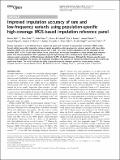Improved imputation accuracy of rare and low-frequency variants using population-specific high-coverage WGS-based imputation reference panel
Author(s)
Mitt, Mario; Kals, Mart; Pärn, Kalle; Ripatti, Samuli; Morris, Andrew P; Metspalu, Andres; Esko, Tõnu; Mägi, Reedik; Palta, Priit; Gabriel, Stacey; Lander, Eric Steven; Palotie, Aarno; ... Show more Show less
Downloadejhg201751.pdf (1.120Mb)
PUBLISHER_CC
Publisher with Creative Commons License
Creative Commons Attribution
Terms of use
Metadata
Show full item recordAbstract
Genetic imputation is a cost-efficient way to improve the power and resolution of genome-wide association (GWA) studies. Current publicly accessible imputation reference panels accurately predict genotypes for common variants with minor allele frequency (MAF)≥5% and low-frequency variants (0.5≤MAF<5%) across diverse populations, but the imputation of rare variation (MAF<0.5%) is still rather limited. In the current study, we evaluate imputation accuracy achieved with reference panels from diverse populations with a population-specific high-coverage (30 ×) whole-genome sequencing (WGS) based reference panel, comprising of 2244 Estonian individuals (0.25% of adult Estonians). Although the Estonian-specific panel contains fewer haplotypes and variants, the imputation confidence and accuracy of imputed low-frequency and rare variants was significantly higher. The results indicate the utility of population-specific reference panels for human genetic studies.
Date issued
2017-04Department
Broad Institute of MIT and Harvard; Massachusetts Institute of Technology. Department of BiologyJournal
European Journal of Human Genetics
Publisher
Nature Publishing Group
Citation
Mitt, Mario et al. “Improved Imputation Accuracy of Rare and Low-Frequency Variants Using Population-Specific High-Coverage WGS-Based Imputation Reference Panel.” European Journal of Human Genetics 25, 7 (April 2017): 869–876 © 2017 The Author(s)
Version: Final published version
ISSN
1018-4813
1476-5438